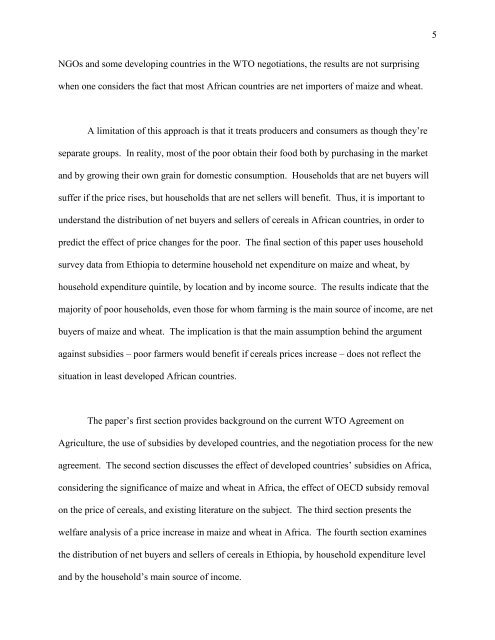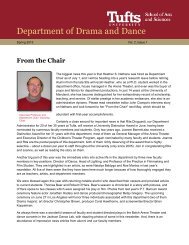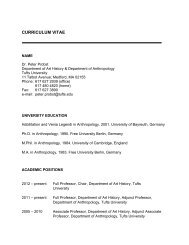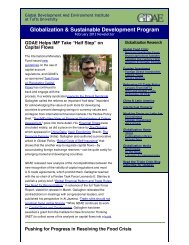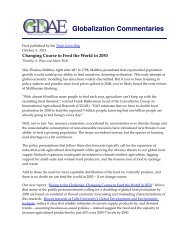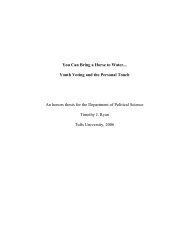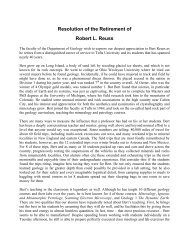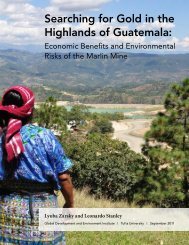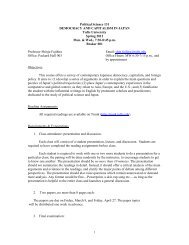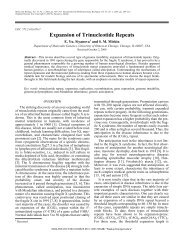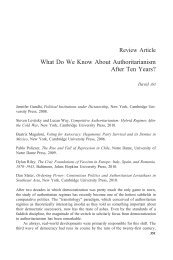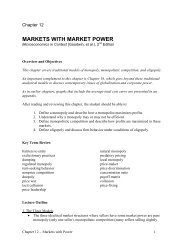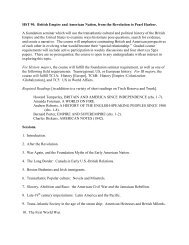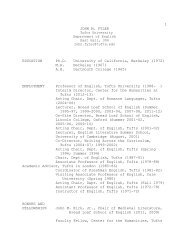The Impact of a New WTO Agricultural Agreement ... - Tufts University
The Impact of a New WTO Agricultural Agreement ... - Tufts University
The Impact of a New WTO Agricultural Agreement ... - Tufts University
You also want an ePaper? Increase the reach of your titles
YUMPU automatically turns print PDFs into web optimized ePapers that Google loves.
5<br />
NGOs and some developing countries in the <strong>WTO</strong> negotiations, the results are not surprising<br />
when one considers the fact that most African countries are net importers <strong>of</strong> maize and wheat.<br />
A limitation <strong>of</strong> this approach is that it treats producers and consumers as though they’re<br />
separate groups. In reality, most <strong>of</strong> the poor obtain their food both by purchasing in the market<br />
and by growing their own grain for domestic consumption. Households that are net buyers will<br />
suffer if the price rises, but households that are net sellers will benefit. Thus, it is important to<br />
understand the distribution <strong>of</strong> net buyers and sellers <strong>of</strong> cereals in African countries, in order to<br />
predict the effect <strong>of</strong> price changes for the poor. <strong>The</strong> final section <strong>of</strong> this paper uses household<br />
survey data from Ethiopia to determine household net expenditure on maize and wheat, by<br />
household expenditure quintile, by location and by income source. <strong>The</strong> results indicate that the<br />
majority <strong>of</strong> poor households, even those for whom farming is the main source <strong>of</strong> income, are net<br />
buyers <strong>of</strong> maize and wheat. <strong>The</strong> implication is that the main assumption behind the argument<br />
against subsidies – poor farmers would benefit if cereals prices increase – does not reflect the<br />
situation in least developed African countries.<br />
<strong>The</strong> paper’s first section provides background on the current <strong>WTO</strong> <strong>Agreement</strong> on<br />
Agriculture, the use <strong>of</strong> subsidies by developed countries, and the negotiation process for the new<br />
agreement. <strong>The</strong> second section discusses the effect <strong>of</strong> developed countries’ subsidies on Africa,<br />
considering the significance <strong>of</strong> maize and wheat in Africa, the effect <strong>of</strong> OECD subsidy removal<br />
on the price <strong>of</strong> cereals, and existing literature on the subject. <strong>The</strong> third section presents the<br />
welfare analysis <strong>of</strong> a price increase in maize and wheat in Africa. <strong>The</strong> fourth section examines<br />
the distribution <strong>of</strong> net buyers and sellers <strong>of</strong> cereals in Ethiopia, by household expenditure level<br />
and by the household’s main source <strong>of</strong> income.


